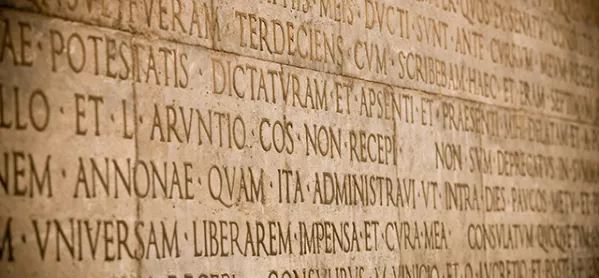Translating Taylor Swift and reimagining Disney songs could “engage” a new generation of Latin students, according to a Cambridge specialist.
Steven Hunt, who has taught Latin for 35 years and trains new teachers through the University of Cambridge’s PGCE course, has called for a rethink of how the classical language is taught, and suggests that the mainstream use of 1950s-style practices is linked to dwindling uptake of the subject.
In his new book, Teaching Latin: Contexts, Theories, Practices, Mr Hunt argues that students would understand Latin better if they were exposed to chances to speak, sing or write creatively in it, moving away from a focus on grammar tables and translating set texts.
He also discusses how he is “horrified” that he once taught stories that trivialise slavery and stereotype female characters.
In the book, Mr Hunt cites a university lecturer asking students to translate the chorus of Swift’s song Bad Blood to “Quod, care, nunc malum sanguinem habemus”.
He also cites how teachers can use Latinised Disney songs, with one YouTube channel imagining how the Frozen song Let It Go might have sounded in Ancient Rome.
And he mentions how teachers can use 3D digital modelling and Google Earth to encourage students to use Latin during virtual walk-throughs of ancient sites, such as a 3D model of Rome built in the computer game, Minecraft.
Mr Hunt said that these tools could be used in schools. He added: “The Taylor Swift reference is from a college-level programme, but getting students to engage with things that interest them will engage them in schools, too.
“The book is designed to get teachers outside of their comfort zone and to make Latin fun.”
Inspiration from modern languages teaching
Mr Hunt also said that classicists are sometimes “reluctant” to look at how second languages are taught in schools more widely, but that techniques used to teach these subjects could hold the key to teaching Latin successfully as well.
“There is no ‘best way’ to teach it, but some teachers are creating a rich set of responses to the challenge,” he said. “Most draw on principles from modern languages education. Because the human brain is hardwired for sound, it learns by speaking, listening and using language. Some Latin teachers are realising that this is the way to learn any language - dead or alive.”
Slavery in ancient Rome is presented as a trivial or even humorous matter, according to Mr Hunt, while some course materials fail to represent the diversity of the classical world.
“Students need to see themselves in the textbooks and they also need to see the other - the marginalised, the little-heard and little-seen,” he added.
A 2021 Language Trends survey from the British Council revealed a “stark divide” between private and state schools for Classics teaching, with 65 per cent of independent schools offering GCSE Latin and one in three offering Ancient Greek, compared with 9 per cent and less than 2 per cent of state schools respectively.




